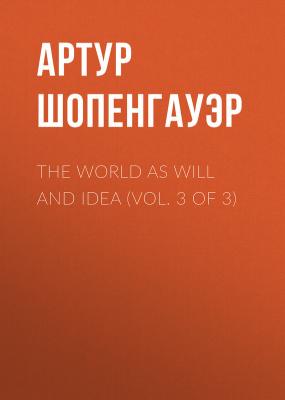The World as Will and Idea (Vol. 3 of 3). Артур Шопенгауэр
Читать онлайн.| Название | The World as Will and Idea (Vol. 3 of 3) |
|---|---|
| Автор произведения | Артур Шопенгауэр |
| Жанр | Философия |
| Серия | |
| Издательство | Философия |
| Год выпуска | 0 |
| isbn |
Only where all a priori assertions cease, therefore in the entirely empirical part of our knowledge of bodies, in their form, quality, and definite manner of acting, does that will reveal itself which we have already recognised and established as the true inner nature of things. But these forms and qualities always appear only as the properties and manifestations of that very matter the existence and nature of which depends upon the subjective forms of our intellect, i. e., they only become visible in it, and therefore by means of it. For that which always exhibits itself to us is only matter acting in some specially determined manner. Out of the inner properties of such matter, properties which cannot be further explained, proceeds every definite kind of effect of given bodies; and yet the matter itself is never perceived, but only these effects, and the definite properties which lie at their foundation, after separating which, matter, as that which then remains over, is necessarily added in thought by us; for, according to the exposition given above, it is objectified causality itself. Accordingly matter is that whereby the will, which constitutes the inner nature of things, becomes capable of being apprehended, perceptible, visible. In this sense, then, matter is simply the visibility of the will, or the bond between the world as will and the world as idea. It belongs to the latter inasmuch as it is the product of the functions of the intellect, to the former inasmuch as that which manifests itself in all material existences, i. e., phenomena is the will. Therefore every object is, as thing in itself, will, and as phenomenon, matter. If we could strip any given matter of all the properties that come to it a priori, i. e., of all the forms of our perception and apprehension, we would have left the thing in itself, that which, by means of those forms, appears as the purely empirical in matter, but which would then itself no longer appear as something extended and active; i. e., we would no longer have matter before us, but the will. This very thing in itself, or the will, in that it becomes a phenomenon, i. e., enters the forms of our intellect, appears as matter, i. e., as the invisible but necessarily assumed supporter of the properties which are only visible through it. In this sense, then, matter is the visibility of the will. Consequently Plotinus and Giordano Bruno were right, not only in their sense but also in ours, when they made the paradoxical assertion already referred to in chapter 4: Matter itself is not extended, consequently it is incorporeal. For space, which is our form of perception, imparts extension to matter, and corporeal existence consists in acting, which depends upon causality, and consequently upon the form of our understanding. On the other hand, every definite property, thus everything empirical in matter, even gravity, depends upon that which only becomes visible by means of matter, the thing in itself, the will. Gravity is yet the lowest of all grades of the objectification of the will; therefore it appears in all matter without exception, thus is inseparable from matter in general. Yet, just because it is a manifestation of the will, it belongs to knowledge a posteriori, not to knowledge a priori. Therefore we can always picture to ourselves matter without weight, but not without extension, repulsive force, and stability, for then it would be without impenetrability, and consequently would not occupy space, i. e., it would be without the power of acting; but the nature of matter as such just consists in acting, i. e., in causality in general; and causality depends upon the a priori form of our understanding, and therefore cannot be thought away.
Matter is accordingly the will itself, but no longer in itself, but so far as it is perceived, i. e., assumes the form of the objective idea. Thus what objectively is matter is subjectively will. Exactly corresponding to this, as was proved above, our body is just the visibility, objectivity of our will, and so also every body is the objectivity of the will at some one of its grades. Whenever the will exhibits itself to objective knowledge it enters into the forms of perception of the intellect, time, space, and causality. But on account of this it exists at once as a material object. We can present to our minds form without matter, but not the reverse; because matter deprived of form would be the will itself, and the will only becomes objective by entering the forms of perception of our intellect, and therefore only by means of the assumption of form. Space is the form of perception of matter because the latter is the substance (Stoff) of mere form, but matter can appear only in form.
Since the will becomes objective, i. e., passes over into the idea, matter is the universal substratum of this objectification, or rather it is this objectification itself taken abstractly, i. e., regarded apart from all form. Matter is accordingly the visibility of the will in general, while the character of its definite manifestations has its expression in form and quality. Hence what in the manifestation, i. e., for the idea, is matter is in itself will. Therefore, under the conditions of experience and perception, everything holds good of it that holds good of the will in itself, and it repeats all the relations and properties
